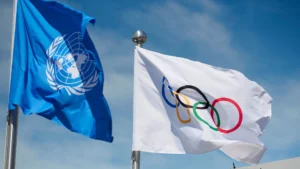The Role of Sport in Strengthening International Relations and Peacemaking
Job Overview

The Role of Sport in Strengthening International Relations and Peacemaking
The Role of Sport in Strengthening International Relations and Peacemaking
Sport has the unique ability to bridge the gap between borders, cultures and ideologies, bringing people together in an atmosphere of competition and friendly rivalry and melbet-cm.com provides such an environment. This universal passion makes sport an invaluable tool for diplomacy, both globally and bilaterally.
Public diplomacy using sport is becoming increasingly popular. We will look at the main examples in this article.
Soft Power
Sport’s ability to bring people together in an informal and universal setting allows participants to see past differences of culture, language and belief systems. Through sporting exchange programs this special connection can be fostered; contributing greatly to sports diplomacy’s’soft power’ capabilities.
Embassys and consulates around the world engage in sporting activities with local communities on an ongoing basis, often tied to foreign-policy goals such as climate change or women’s empowerment – often in partnership with an in-country partner organization. Laureus uses this model for its global sports-for-development exchanges designed to promote social change while increasing cultural understanding between countries.
Mega sporting events like the Olympics provide valuable diplomatic engagement by uniting athletes and spectators from different parts of the globe to meet and exchange views. Unfortunately, such events can also be used as political propaganda by authoritarian regimes to divert attention away from human rights abuses and other negative issues.
Today’s era of soft power sees states turning away from seeking solutions between themselves in favor of building bridges between populations (and individuals) instead. This change has lead to greater emphasis on public diplomacy as well as informal channels such as sports.
Public Diplomacy
Diplomacy and sports have always had a close relationship. From early civilisation days onwards, sporting competitions like the Olympics served to foster peace among city-states while acting as an instrument of foreign policy. Only more recently have athletic competitions become an effective diplomatic tool.
Public Diplomacy refers to efforts undertaken by nations to promote their interests at global sporting events through athletes or sport-related policies, through international sporting events or their athletes themselves. There are two elements involved with public diplomacy – official and unofficial; official diplomatic events often provide state governments with an opportunity to hold informal diplomatic meetings, discuss current issues, or develop agreements on specific subjects while unofficial events often include state promotion via national teams or star athletes who represent them abroad.
Australian government authorities have created an official Sport Diplomacy Division and implemented a progressive “Sports Diplomacy 2030” strategy, in which hosting major sporting events, promoting social-cultural change through sport and using sport as an instrument of foreign policy goals are all key pillars.
Strategies are implemented through various actors – government agencies and departments, athletes, the media, private initiatives and others. For instance, in Australia the Australian government is working closely with community leaders to run programs teaching young women and girls basketball, volleyball and other sports skills that develop leadership, teamwork and communication capabilities for positive impacts in domestic as well as international communities.
Conflict Resolution
Although sport is generally seen as competitive, it can actually play an instrumental role in creating peace among nations and peoples. This can happen through direct interactions such as exchanges between athletes or spectators from various nations – this premise underpinning sports diplomacy, an emerging form of international relations in recent years.
Sports diplomacy combines soft power and public diplomacy, and it has evolved to encompass the role of international sport in fostering peace and understanding between nations. Sports have the ability to connect people regardless of language barriers or cultural divides; their common passion can inspire and unite them as no other medium can.
Governments have increasingly turned to sport as a diplomatic tool, exploiting its inherent powers to influence global opinion and promote their interests. Sport has developed an appeal across generations – whether people play professionally or simply enjoy watching it as fans.
International sport serves as an effective medium for diplomatic activities and development outcomes such as sustainable health, social cohesion and disability inclusion. Furthermore, sporting organizations like IOC, FIFA and ICC can serve as important diplomatic forums that foster interactions among their member nations while acting as impartial arbitrators when disputes arise or host cities need to be selected for major events.
Sport for Peace
Nelson Mandela once famously stated, “Sport has the ability to transcend race, language, religion and culture barriers and bring people together regardless of race, language, religion or culture.” This principle applies not only on an international scale (such as Chinese-American reconciliation through ping pong in 1971 to alleviate Cold War tensions) but also at local grassroots levels where grassroot Sport for Peace programs bring people together with similar goals together with shared spaces and equipment in an atmosphere of respect that fosters relationship building that facilitates conflict transformation processes.
These programs can be implemented at relatively low costs; usually only space, basic sports equipment and volunteers are needed to create a Sport for Peace programme. Therefore, it is crucial that we support and encourage these groups as they expand their activities.
However, SDP should be acknowledged that it has its critics. International sport at an elite level remains marred by corruption, financial mismanagement, doping scandals and violence; failure to address these issues could detract from its positive influence on international development.
Sports must play an essential part in peace-building processes by holding itself to ethical standards and being held to account for its actions and conduct. This requires elite sport organizations to adopt standards and reforms that will help make sport an effective tool for international development.
- Total Jobs 349 Jobs
- Category Nafasi za Ajira
- Location Tanzania


